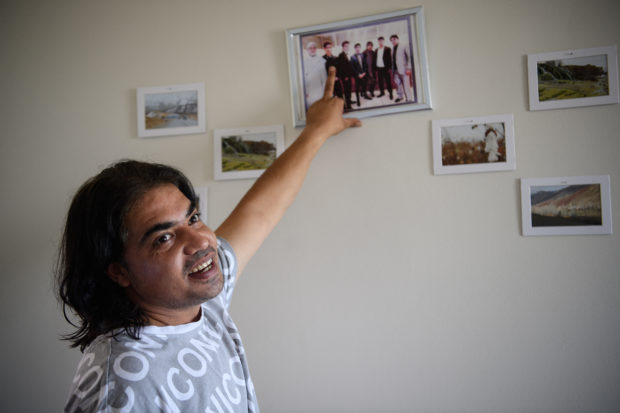
Samim Zalmy shows pictures of himself with his brothers and their father in his apartment in Falls Church, Virginia, on August 5, 2021. AFP
FALLS CHURCH, United States — The walls of the one-bed Virginia apartment Samim Zalmi shares with his wife and children are decorated with photos of sweeping Afghan landscapes, reminders of his birth country in what he calls his “second home.”
Zalmi, 35, landed at Dulles International Airport outside Washington three years ago with his wife Zarifa and then-four-year-old daughter on a Special Immigrant Visa — the same document that will be the ticket to the United States for thousands of Afghans, as the administration withdraws its troops from the conflict-wracked country after 20 years.
“Young generations need to rebuild our own country. Our country needs us. But unfortunately, because of the security… situation, we leave our home country,” Zalmi told AFP from the family’s tidy apartment near the US capital.
“Home is always sweet home, but we have no choice.”
Over 200 Afghans who worked for the United States and their families arrived at Dulles last week, the vanguard for a US push to evacuate thousands from the country.
Many of them fear reprisal from Taliban insurgents, who in recent months have wrested control of vast swaths of territory from the overstretched Afghan military.
It’s a familiar story for Zalmi, who worked as a cameraman for NATO and with USAID for around a decade, but decided to apply for an SIV amid escalating threats from the Taliban against him and his family.
Not being able to continue the work he loved — for which he had been awarded a medal by the Afghan government — and needing to learn English while keeping his family afloat was a struggle.
Zalmi made it through with help from government aid, fellow Afghans and strangers-turned-friends, and with the new arrivals, he wants to pay it forward.
‘Don’t go back’
“In the beginning, it was very hard to believe this is my second country,” he said.
The shock of exile was so sharp that after two months he and his wife both wanted to return to Afghanistan, where they’d shared a home with Zalmi’s mother — widowed by Covid-19 last year — and siblings, including his twin brother, who has been mistaken for Zalmi and is now threatened in turn.
Zalmi said he was ready to go back, despite the threats and having already lost family members in attacks, like so many Afghans.
“If I die over there, people know me. But if I die here, nobody knows me. It was really hard.”
The language barrier was isolating, he said, and a high hurdle for the whole family at first.
“My English wasn’t really good. Nobody understood me when I’m talking. My wife can’t speak English, my daughter couldn’t speak English,” he said, as his daughter, who is now seven and speaks flawless English with an American accent, played with her younger brother nearby with her dad’s camera on the Afghan carpets blanketing the living room.
It was Afghan friends who convinced them to stay and helped Zalmi get started as a driver for apps like Uber and Lyft.
They taught him how to navigate US roads and sold him his first car with the understanding he could pay the $800 a couple hundred dollars at a time.
“He taught me how to handle your life in the United States. He taught me, ‘don’t go back.'”
‘King of the camera’
As he got on the road, he struck up new friendships, including with a passenger and her family, who helped keep Zalmi’s afloat when the rug almost came out from under their American life.
When his and Zarifa’s son was born and had to be hospitalized for a month, their American friends helped with the rent and Medicaid staved off the United State’s notoriously expensive healthcare costs.
Today, having started out driving with $50 in his pocket, Zalmi has two cars and is assured behind the wheel of his sleek Honda, which also bears reminders of his first home, with another of Afghanistan’s famed carpets padding the hatchback trunk so he can rest between fares and sip from a thermos of tea Zarifa prepares daily.
But he never thought he’d be a taxi driver and would rather be behind a camera than a steering wheel.
“I’m still looking for my goal to be king of the camera in DC. So maybe it’s (going to) happen, one day. Everything is possible if you take it easy, work hard.”
But while he’s still driving, he said he’s ready with a helping hand for new Afghan arrivals.
“If they need a ride I am able to do that… same as what people did for me,” he said.
“And I will say, ‘Welcome. Welcome to the United States.'”